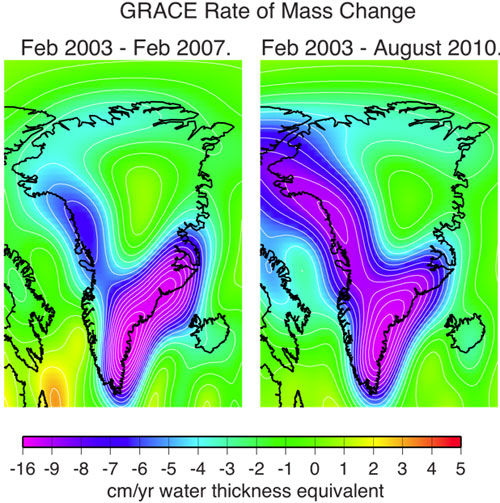Greenland ice mass loss after the 2010 summer
Posted on 1 November 2010 by John Cook
The National Oceanic and Atmospheric Administration (NOAA) recently released the Arctic Report Card. The report contains a wealth of information about the state of climate in the Arctic circle (mostly disturbing). Especially noteworthy is the news that in 2010, Greenland temperatures were the hottest on record. It also experienced record setting ice loss by melting. This ice loss is reflected in the latest data from the GRACE satellites which measure the change in gravity around the Greenland ice sheet (H/T to Tenney Naumer from Climate Change: The Next Generation and Dr John Wahr for granting permission to repost the latest data).

Figure 1: Greenland ice mass anomaly - deviation from the average ice mass over the 2002 to 2010 period. Note: this doesn't mean the ice sheet was gaining ice before 2006 but that ice mass was above the 2002 to 2010 average.
The ice sheet has been steadily losing ice and the rate of ice loss has doubled over the 8 year period since gravity measurements began. The accelerating ice loss is independently confirmed by GPS measurements of uplifting bedrock. The GRACE data gives us an insight into why Greenland is losing ice mass at such an accelerating rate - ice loss has spread from the south east all the way up the west coast:

Figure 2: rate of mass change from Greenland over 2003-2007 and 2003-2010 periods. Mass loss rate has spread up the north western ice margin over the last few years.































 Arguments
Arguments
























 0
0  0
0






Comments